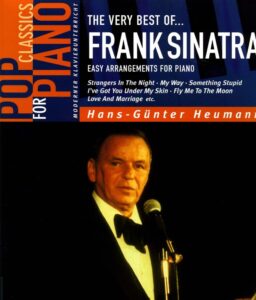Come join us now, and enjoy playing your beloved music and browse through great scores of every level and styles!
Can’t find the songbook you’re looking for? Please, email us at: sheetmusiclibrarypdf@gmail.com We’d like to help you!
Table of Contents
My Way (Frank Sinatra ver.) Piano Solo sheet music, Noten, partitura, spartiti, 楽譜, 乐谱

Best Sheet Music download from our Library.

Please, subscribe to our Sheet Music Library.
If you are already a subscriber, please, check our NEW SCORES’ page every month for new sheet music. THANK YOU!
Of all the songs in the Great American Songbook, few command the immediate, visceral respect of Frank Sinatra’s “My Way.” It is more than a song; it is a monument. A declaration of selfhood so powerful that it transcends its own melody to become a final statement, a secular hymn, and an epic performance that Sinatra, the greatest interpreter of song in popular music, sealed as his own.

The story of how “My Way” became Sinatra’s most epic performance begins not with him, but with a French ballad. Composed by Claude François and Jacques Revaux as “Comme d’habitude” (“As Usual”), the song was a melancholic tale of a dying relationship, sung with a quiet, weary resignation. It was Paul Anka who, upon hearing the tune, saw its potential for something grander. He acquired the rights and completely rewrote the lyrics, crafting a narrative not of a fading love, but of a life fully lived. He tailored it specifically for Sinatra, whom he sensed was contemplating his own legacy.
The lyrics Anka penned are the foundational pillar of the song’s epic quality. They are a soliloquy, a summing-up. From the opening line, “And now, the end is near,” the listener is placed at a narrative precipice. The song is a review of a life characterized not by conformity, but by defiant individualism. Phrases like “I did what I had to do and saw it through without exemption,” and the iconic, “I did it my way,” are not just lyrics; they are a personal creed. Sinatra wasn’t just singing words; he was embodying a philosophy.
But the true alchemy, the transformation of a great song into an epic performance, lies in Sinatra’s delivery. This is where the artist, at the peak of his powers, fused with the material so completely that the line between Frank Sinatra and the narrator vanished.

Browse in the Library:
Or browse in the categories menus & download the Library Catalog PDF:
1. The Voice as an Instrument of Weather and Time:
By 1969, when “My Way” was recorded, Sinatra’s voice was no longer the supple, effortless instrument of his youth. The years had taken their toll, leaving a instrument that was darker, grainier, and carried the weight of lived experience. This was not a detriment; it was the essential ingredient. When he sings of “regrets, I’ve had a few,” you hear the gravel of those regrets. When he boasts, “I did it my way,” the slight wear and tear on the notes lend an authenticity a younger voice could never muster. This was a man who had earned the right to sing these words.
2. The Mastery of Phrasing and Dynamics:
Sinatra’s genius as a vocalist was his unparalleled phrasing. He doesn’t just sing the melody; he narrates it. Notice the quiet, almost conversational tone of the opening verses, as if he’s confiding in you alone. He builds tension slowly, his voice swelling with the orchestration. Then comes the climactic bridge: “Yes, there were times, I’m sure you knew / When I bit off more than I could chew.” Here, he unleashes a controlled power, pushing his voice to its emotional limits, embodying the struggle and the triumph. The final, defiant declaration of “I did it my way” is delivered not with a shout, but with a granite resolve that is far more powerful.
3. The Don Costa Arrangement:
No discussion of “My Way” is complete without the monumental arrangement by Don Costa. It begins with that iconic, somber four-chord guitar intro, immediately setting a tone of gravitas. The orchestra doesn’t just accompany Sinatra; it acts as a Greek chorus, swelling with his pride, receding during his reflections, and crashing with cinematic force at the song’s peaks. It is a wall of sound, but a meticulously crafted one, designed to frame the voice at its center in the most heroic light possible.
The Legacy: A Self-Written Eulogy
The epic nature of “My Way” is cemented by its reception. It became Sinatra’s signature song for the latter part of his career, a number he was almost obligated to perform at every concert. He sometimes grew weary of it, jokingly referring to it as “the national anthem,” but he could never escape its power. The public had accepted it as his authentic self-portrait.
The performance became so iconic that it has taken on a life of its own, used at funerals, retirements, and moments of personal conclusion around the world. It is the sound of a man standing at the end of his journey, looking back without apology. Sinatra didn’t just sing “My Way”; he testified.
In the end, Frank Sinatra made “My Way” his most epic performance by living a life that mirrored its message and possessing the artistic prowess to translate that life into song. He took a French ballad of quiet despair and, through sheer force of character and interpretive genius, turned it into a roaring, unassailable anthem of the human spirit. It is the ultimate marriage of singer and song, a performance so colossal that it forever defines the man, the artist, and the unyielding creed of doing it your way.
